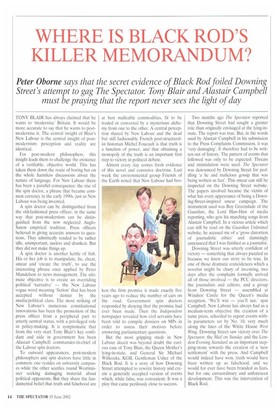WHERE IS BLACK ROD'S KILLER MEMORANDUM?
Peter Oborne says that the secret evidence of Black Rod foiled Downing
Street's attempt to gag The Spectator Tony Blair and Alastair Campbell must be praying that the report never sees the light of day
TONY BLAIR has always claimed that he wants to 'modernise' Britain. It would he more accurate to say that he wants to postmodernise it. The central insight of Blair's New Labour is the central insight of postmodernism: perception and reality are identical.
For post-modern philosophers, this insight leads them to challenge the existence of a verifiable, objective world. This has taken them down the route of boring but on the whole harmless discussions about the nature of language. For New Labour there has been a parallel consequence: the rise of the spin doctor, a phrase that became common currency in the early 1990s, just as New Labour was being invented.
A spin doctor can be distinguished from the old-fashioned press officer, in the same way that post-modernism can be distinguished from the now neglected AngloSaxon empirical tradition. Press officers believed in giving accurate answers to questions. They admittedly tended to be rather idle, unimportant, useless and drunken. But they did not make things up.
A spin doctor is another kettle of fish. His or her job is to manipulate, lie, cheat, smear and 'create the truth', to use the interesting phrase once applied by Peter Mandelson to news management. The ultimate objective is to create an overriding political 'narrative' — the New Labour vogue word meaning 'fiction' that has been accepted without demur by the media/political class. The most striking of New Labour's numerous constitutional innovations has been the promotion of the press officer from a peripheral part to utterly central status, with a privileged role in policy-making. It is symptomatic that from the very start Tony Blair's key confidant and aide in government has been Alastair Campbell: commander-in-chief of the Labour spin doctors.
To outward appearances, post-modern philosophers and spin doctors have little in common: one resides on university campuses while the other scuttles round Westminster seeking damaging material about political opponents. But they share the fundamental belief that truth and falsehood are at best malleable commodities, fit to be traded or converted by a mysterious alchemy from one to the other. A central perception shared by New Labour and the dead but still fashionable French post-structuralist historian Michel Foucault is that truth is a function of power, and that obtaining a monopoly of the truth is an important first step to victory in political debate.
Almost every day comes fresh evidence of this novel and corrosive doctrine. Last week the environmental group Friends of the Earth noted that New Labour had bro ken the firm promise it made exactly five years ago to reduce the number of cars on the road. Government spin doctors responded by denying that the promise had ever been made. Then the Independent newspaper revealed how civil servants have been told to compile dossiers on MPs in order to assess their motives before answering parliamentary questions.
But the most gripping study in New Labour deceit was beyond doubt the curious case of Tony Blair, the Queen Mother's lying-in-state, and General Sir Michael Willcocks, KGB, Gentleman Usher of the Black Rod. It is a story of how Downing Street attempted to rewrite history and create a generally accepted version of events which, while false, was convenient. It was a ploy that came perilously close to success. Two months ago The Spectator reported that Downing Street had sought a greater role than originally envisaged at the lying-instate. The report was true. But, in the words used by Alastair Campbell in his submission to the Press Complaints Commission, it was 'very damaging'. It therefore had to be written out of history. The pattern of events that followed was only to be expected. Threats and intimidation were used. The Spectator was denounced by Downing Street for peddling 'a lie and malicious gossip that was being written as fact'. This smear can still be inspected on the Downing Street website. The papers involved became the victim of what has every appearance of being a Downing-Street-inspired smear campaign. The instrument used was Roy Greenslade of the Guardian, the Lord Haw-Haw of media reporting, who gets his marching songs from Alastair Campbell. In a vicious article which can still be read on the Guardian Unlimited website, he accused me of a 'gross distortion of journalistic ethics' and damningly announced that I was finished as a journalist.
Downing Street was utterly confident of victory — something that always puzzled us because we knew our story to be true. In one of those dramatic coincidences which a novelist might be chary of inventing, two days after the complaint formally arrived all of those involved — the FCC directors. the journalists and editors, and a group from Downing Street — assembled at Windsor Castle for the Queen's media reception. 'We'll win — see.' spat Campbell. New Labour has always had as a medium-term objective the creation of a tame press, schooled to report events within parameters set by No. 10, very much along the lines of the White House West Wing. Downing Street saw victory over The Spectator, the Mail on Sunday and the London Evening Standard as an important stepping-stone towards the creation of a 'new settlement' with the press. And Campbell would indeed have won, truth would have been written up as falsehood, and we would for ever have been branded as liars, but for one extraordinary and unforeseen development. This was the intervention of Black Rod.


































































 Previous page
Previous page